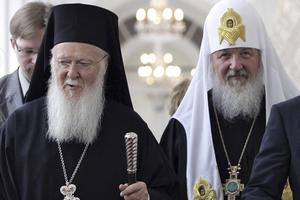Anglican-Catholic Events in Rome This Week Raise False Hopes of Unity
Despite many worthy Anglican-Catholic initiatives this week, true unity remains a distant dream.

As part of a week of festivities marking half a century of Anglican-Catholic dialogue, nineteen pairs of Anglican and Catholic bishops from around the world will be commissioned tomorrow to embark on a joint mission to spread the Gospel.
The initiative will be launched at an ecumenical vespers service in Rome’s San Gregorio al Cielo church, attended by Pope Francis and the Archbishop of Canterbury, the Most Rev. Justin Welby.
The joint mission is the fruit of dialogue undertaken by the International Anglican Roman Catholic Commission on Unity and Mission. The commission’s Catholic bishops and their Anglican counterparts have been taking part in a summit that began in Canterbury on Sept. 30 and concludes in Rome on Friday.
Also being celebrated this week is the 50th anniversary of the Anglican Center in Rome which was opened in 1966 after the historic meeting in Rome between the Anglican Archbishop of Canterbury, Michael Ramsey, and Pope Paul VI. The center is aimed at helping to foster unity.
Archbishop Welby will be in Rome for all the week’s events and will have his third private meeting with Pope Francis tomorrow. In a symbolic gesture, he will be wearing the papal ring that Paul VI presented Archbishop Ramsey at the Vatican.
The Anglican Communion is keen to trumpet this week’s events as evidence of “closer and deeper” Catholic-Anglican relations, and a time for leaders of both the Catholic Church and the Anglican Communion to “look ahead to opportunities for greater unity.”
The Anglican co-chair of the International Anglican Roman Catholic Commission on Unity and Mission, the Most Rev. David Hamid, said that the joint mission initiative “is an immensely significant occasion”. From his point of view, he said there has been “such an extraordinary progress towards reconciliation” over the past 50 years.
“It is easy to forget just how far we have journeyed together as sisters and brothers in Christ,” he said. “The common faith we have discovered through our years of dialogue now compels us to act together, sharing in Christ's mission in the world".
But while it might be true that relations have significantly thawed over the past half century, when it comes to the crucial areas of doctrine, ecclesiology and morality, Rome and Canterbury have actually never been further apart since the detente of the 1960s.
Women priests and bishops are now allowed throughout the Anglican Communion (the Vatican once said the ordination of women as bishops in the Church of England would put an end to any hope of “restoration of full communion”). Meanwhile, in areas of the Communion, notably in North America, clergy and bishops have been allowed to “marry” their same-sex partners, and clergy have been permitted to conduct same-sex “marriages.” A group of Church of England clergy wrote in a letter in The Sunday Times last month that they wanted to eventually see homosexual couples allowed to "marry" in church.
Also worsening the chances of unity are the deep divisions in the Anglican Communion over these very issues, which make effective dialogue with the Holy See even harder. Earlier this year, the Anglican Communion stepped back from the brink of schism after its 38 primates voted to sanction the Episcopal Church, the American branch of Anglicanism, because of its unilateral decision to conduct same-sex “marriages.” Since that time, matters have not improved and the divisions persist.
Beyond these significant obstacles, deep theological differences also remain unresolved — issues that will be the subject of a symposium at the Pontifical Gregorian University on Wednesday.
Notwithstanding therefore these worthy initiatives and the appearance of ever closer union with Rome this week, the reality sadly remains quite different.

















